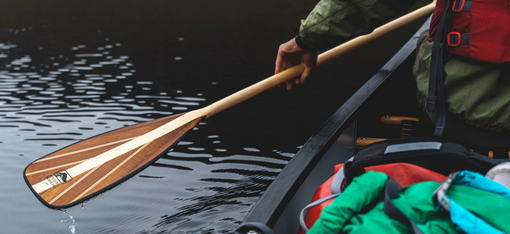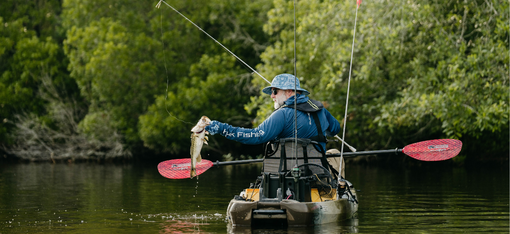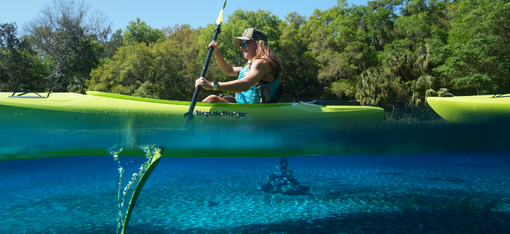The Love/Hate Relationship with Smartphones on Wilderness Canoe Trips
7-minute read
Bending Branches Prostaffer and long-distance canoeist Martin Trahan wrote an Instagram post about the pros and cons of smartphone use on wilderness canoe trips. “Toxicity or an essential tool?”
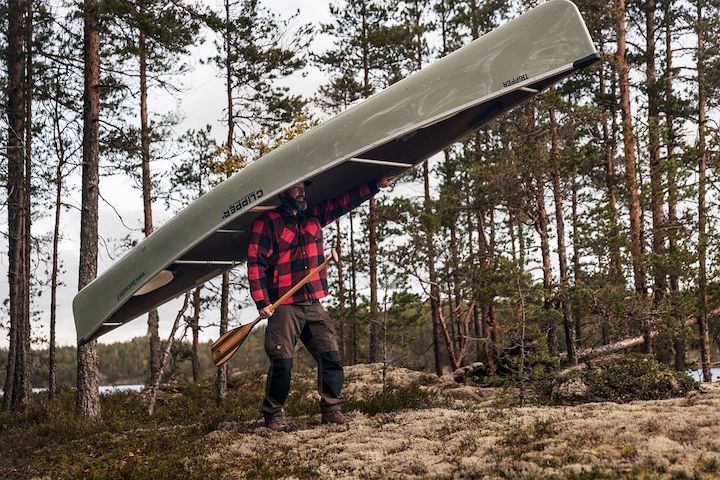
Martin Trahan, canoeist (photo courtesy of Martin and @canoe_and_tomato)
As he notes in his editorial there, the Internet and cell service have been rapidly expanding so it’s often now possible to get access even in remote areas. Back in the first half of Bending Branches’ company history—and even in 1999 when Martin began covering huge distances by canoe—smartphones didn’t exist.
All that’s changed now. And most of us are so used to carrying one everywhere we go that we feel at a loss if we forget it or even intentionally leave it behind. “They gradually found their way onto the list of [canoe] expedition must-haves,” says Martin.
A Blessing or a Curse?
In many ways, one of the best parts of a wilderness canoe trip is leaving everything behind—including technology. It’s relying on print maps, research and our skills to help us make our way along our route during the few days or weeks we’re out. It’s a wonderful challenge for people of all ages and experience levels.
And it’s a wonderful break from the constant bombardment of media and information. Of always being available.
On the other hand, as Martin says, “The phone can come in very handy as a GPS, to access maps, to understand distances to cover, locate dangers to avoid, find out about the weather and make phone calls in case of need/emergency.”
He goes on: “What's more, the latest phones are waterproof and much more resistant to shocks. They allow us to take photos, film videos and bring our ‘followers’ with us on expeditions, all live.”
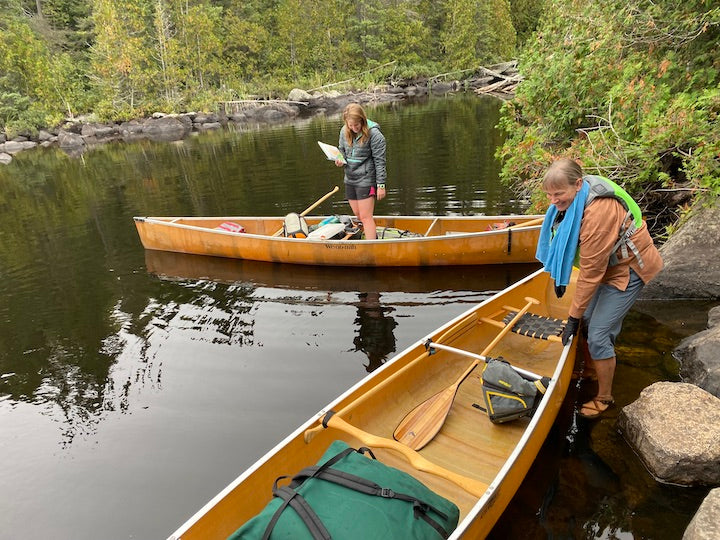
Phone cameras are SO handy to capture life on trail (photo courtesy of Brittany Dokter)
Now with portable battery packs, phones can be recharged several times on a single trip. And most monthly phone plans make unlimited data possible—even in some wilderness areas.
The Temptation of Constant Isolation—Even in Company
One of the social phenomena we’re seeing in our smartphone culture is the paradox of being constantly connected online while disengaged with those right next to us.
Martin tells a story about his experience on a long-distance canoe trip through France. He and his trip mate had non-stop access to the internet throughout the trip. It was very handy for all the reasons we just mentioned.
But, “unfortunately, during our long crossing of France by canoe we were completely dependent on and addicted to our phones. When we woke up in the tent, during every break in the day, at every meal and in the evening again in the tent we were glued to our phones.
“Conversations were few and far between. My teammate and I often isolated ourselves rather than enjoying one another’s company and the beautiful, soothing nature.”
The Problem is Real
It just takes scanning through the comments on Martin’s post to understand he’s not alone in his turmoil about smartphone use in outdoor excursions like canoe trips. Many others offered their own thoughts, experiences and struggles to tame their smartphone use. Here are a couple of examples:
@trekker–heck says, “Yeah, it’s a struggle. It has made itself seem like a necessity. Especially when your livelihood (career, sponsors, followers, route planning, etc.) is done from your phone, you need to be using it a lot. But then you also need to be enjoying these once-in-a-lifetime opportunities that not everyone gets to do. It’s a balance that I haven’t found yet either.”
@jessemec adds, “I personally learned a lot of grit tripping with the resources I had and it forced me to creatively problem solve. Every year that I pick up a contract it’s harder to give youth an experience in places that offer service because they struggling with disconnecting from those devices. I can understand the internal conflict of the use of technology for risk management purposes versus the connection and presence away from those devices.”
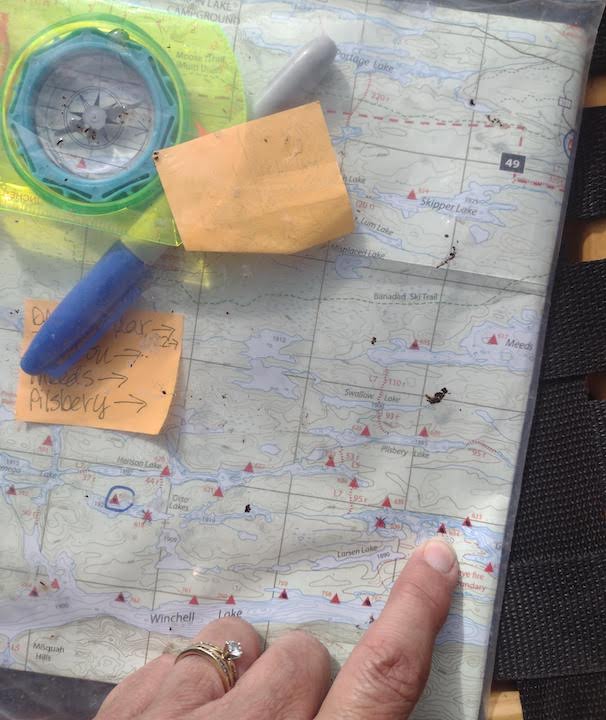
Skills like map reading and using a compass are important to invest in if you’re going to canoe in wilderness areas (photo courtesy of Sharon Brodin)
Creative Ways to Use and Not Use Your Smartphone on Canoe Trips
Fortunately, there are still plenty of wilderness canoe areas that aren’t cell phone accessible (yet). Most of the Boundary Waters, for example, is unreliable, especially the deeper in you get.
But there’s still the temptation to watch movies, listen to music and otherwise disengage from the wilderness experience and others in your group in lieu of entertaining yourself.
Here are some tips to limit smartphone use while you’re out canoeing in the wilderness:
Put Your Phone on Airplane Mode
Airplane mode is an easy way to keep your phone handy for camera use while avoiding the temptation to get online. It also vastly increases the battery life, so frequent charging isn’t necessary.
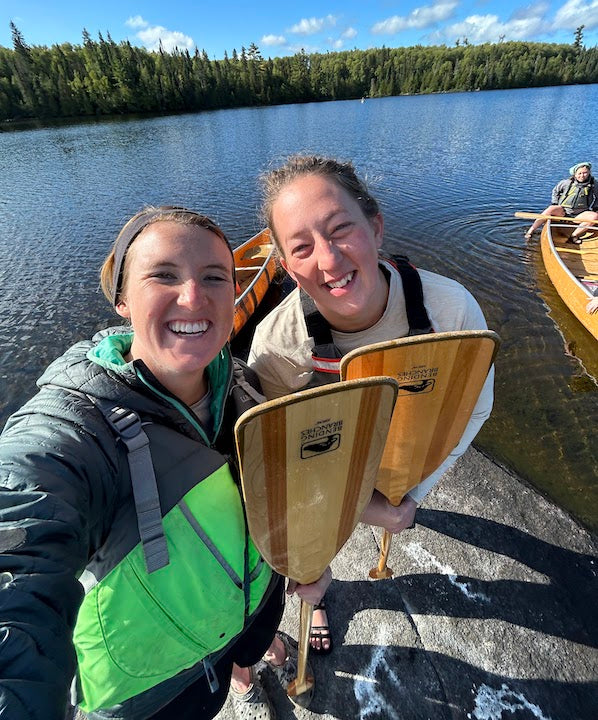
Enjoy the advantages of smartphones while limiting the distractions (photo courtesy of Sarah Rinke)
Make a Pact with Your Group about Phone Use
Get the members of your group together ahead of time and decide how and when you’ll use your phones. It’s easier to overcome temptation if everyone in the group has decided ahead of time the phones will only come out for specific tasks.
You can even make it a Challenge. Think up penalties for those caught using their phone for “illegal” purposes!
Pack Your Phone Away
If you truly are committed to not using your phone but still want it for emergency use (assuming you have signal), make it hard to get to. Pack it at the bottom of a pack and don’t take it out.
If you love to take photos and videos but your phone is too much of a temptation, bring a camera. Old school, maybe, but you can’t watch movies on it!
Plan Your Trip(s) in Destinations with No Cell Service
This will help with internet use, at least. If you can’t access service, the Internet won’t distract you. You still have to make a plan about what’s already loaded on your phone, but this is a start.
Plan for Other Activities
We’re so used to pulling out our phones after five seconds of dead space that many of us have to relearn to be creative, to be bored and have to find something to do.
Take along a deck of cards, a book or two (yes, even an extra pound in your pack can be worth it!), and a small group game everyone can do together around the campfire. Re-discover the art of asking questions and having great conversations. Even have a list of questions everyone can think about during the day and talk about at camp in the evenings.
In Closing
We’ll leave you with a quote from the good folks at Friends of the Boundary Waters:
“Electronics—like Kevlar canoes, waterproof tents and cushy air mattresses—are meant to enhance the experience. They add a layer of security and convenience. However, they can also distract from the experience. Since it is now possible to watch a movie in the BWCA, we must all ask ourselves: How much is too much?
“Certainly, you can bring electronics into the Boundary Waters and still fully experience the wonders of the wilderness.
“But before you load up a few episodes of your favorite show or press play, remember how rare it is to be away from modern entertainment. And how rare it is to camp at the edge of a pristine granite-lined lake in the middle of what we like to think of as America’s premier Wilderness Area.”
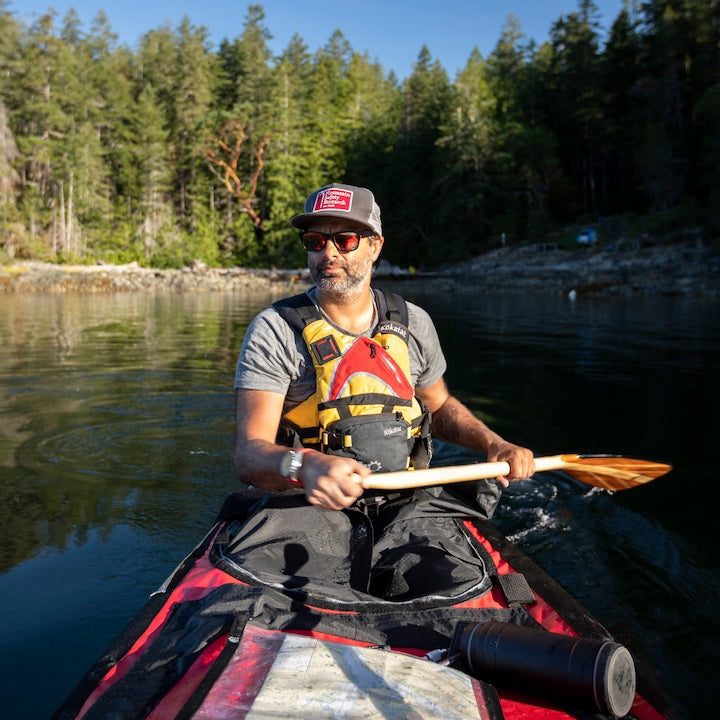
Wilderness canoe trips are too special to allow smartphones to distract you!
We agree! Remember why you’re out there, and commit yourself to enjoying it as fully as you can. It’s a treasure—and usually a rare one.
Read Martin Trahan’s full Instagram post here.
Do you have paddle questions our friendly Customer Service Team can help you with today? Contact them: 715-755-3405 • [email protected]
More for you...




